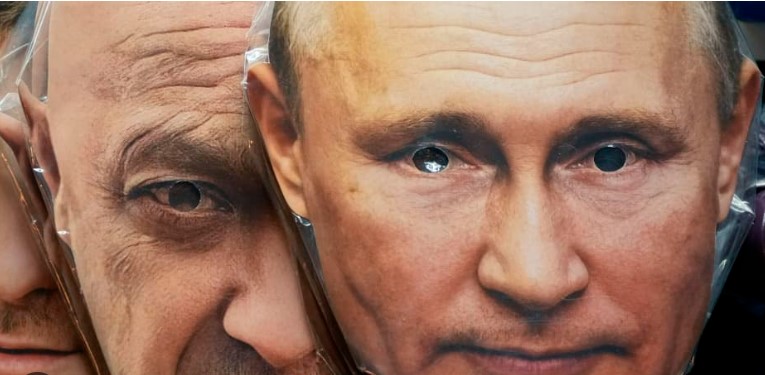Virendra Pandit
New Delhi: Days after the Wagner Group’s short-lived mutiny, President Vladimir Putin has “revealed” what was already known to the world: that Russia raised and funded the private mercenary army of convicts which Moscow unofficially used in Libya, Syria, and other countries–until its ambitious chief revolted on Saturday last week and started marching from Ukraine to the Russian capital.
According to media reports on Wednesday, quoting Putin, Moscow paid nearly USD 2 billion in a year to the Wagner Group, in what is seen as the first time the Russian President acknowledged publicly that the state had funded the mercenary group.
The revelation came on Tuesday that the private army, led by former Putin chef, Yevgeny Prigozhin, was fully funded by the Kremlin and received tens of billions of rubles in public money over the past year.
“I want to point out and I want everyone to know about it: The maintenance of the entire Wagner Group was fully provided for by the state,” Putin said at a meeting with officials from the Russian Defense Ministry, according to state-owned newswires TASS and Ria Novosti. “From the Ministry of Defense, from the state budget, we fully financed this group.”
The Wagner paramilitary group, composed of mostly convicts and created in 2014 by the oligarch-turned-warlord-turned-mutineer Yevgeny Prigozhin, has been involved in some of the fiercest of Russia’s full-scale invasion of Ukraine and is active in various locations in Africa and the Middle East.
But the group is currently in shambles, after Wagner troops, led by Prigozhin, turned against its own creator, Russia’s military leadership last weekend, bringing the country to the verge of a civil war.
The Wagner’s mutiny ended within hours with Prigozhin striking a Belarus-brokered deal with the Kremlin and Minsk, under which all fighters involved in the rebellion would avoid prosecution, while the neutered warlord would flee to Belarus in exile.
Addressing the servicemen in the Kremlin, Putin said the Wagner was financed through the Defense Ministry, which transferred some 86 billion rubles (USD 1.1 billion) between May 2022 and May 2023 for the salaries of mercenaries.
Besides, Prigozhin earned over 80 billion rubles (USD 1 billion) through its company Concord, which got a state order, amounting to this sum.
“I hope that in the course of these works (implementation of the state order), no one stole anything, or, let’s say, stole not so much, but, of course, we will examine everything,” Putin noted.
The Russian President also noted that “the opponent” is trying to profit from the attempted mutiny but fails,” without making clear who he is talking about.
On June 24, Prigozhin accused the Russian Defense Ministry of attacking its fighters, declared “A March of Justice,” and set off toward Moscow, saying in a statement that he was going “to overthrow military chiefs.”
The Federal Security Service designated Wagner Group’s actions as “an armed rebellion” and opened a criminal case against Prigozhin, while Putin called the paramilitary private company’s uprising an act of “treason.”
Belarusian President Alexander Lukashenko said he contributed to the settlement by holding talks with the Wagner chief, which led to Prigozhin’s decision to accept a de-escalation deal.
President Putin on June 27 sought to gloss over the Russian authorities’ lack of immediate reaction to the Wagner mercenaries’ short-lived mutiny over the last weekend, praising the military as the country’s savior from civil war.
Wagner mercenaries on June 24 took over the southwestern city of Rostov-on-Don and covered some 780 kilometers toward Moscow before abruptly aborting their march some 200 kilometers away from the Russian capital in a move that the group’s chief said was meant to “prevent shedding Russian blood.”
However, during their march toward Moscow, Wagner mercenaries shot down several military aircraft, killing at least 10 pilots. President Putin opened his June 27 meeting with military personnel with a minute of silence to honor the pilots and said they “fulfilled their duties with honor.”
“You defended the constitutional order, lives, security, and freedom of our citizens, saved our motherland from shake-ups, actually stopped a civil war,” Putin told some 2,500 military personnel gathered in the Sobornaya Square inside the Kremlin.
In a display of unity at the top of Russia’s leadership, Putin then appeared flanked by Defense Minister Sergei Shoigu while meeting members of security forces after his address.
The dismissal of Shoigu and Chief of the General Staff Valery Gerasimov was one of Prigozhin’s chief demands that triggered the mutiny. The chief mutineer had said the aim of his troops’ march toward Moscow was not to overthrow the elected government but to highlight the incompetence of Russia’s military leadership in its war against Ukraine.
Before he came closer to the Russian President, Prigozhin’s longtime catering business earned him the monicker “Putin’s chef.”
In his first public statement since abruptly renouncing the mutiny, Prigozhin on June 26 said his action was a “master class” on how Russia’s army should have carried out its invasion of Ukraine in February 2023, highlighting what he said were multiple holes in military security that allowed his group to easily take control of cities as it proceeded toward Moscow.
.

